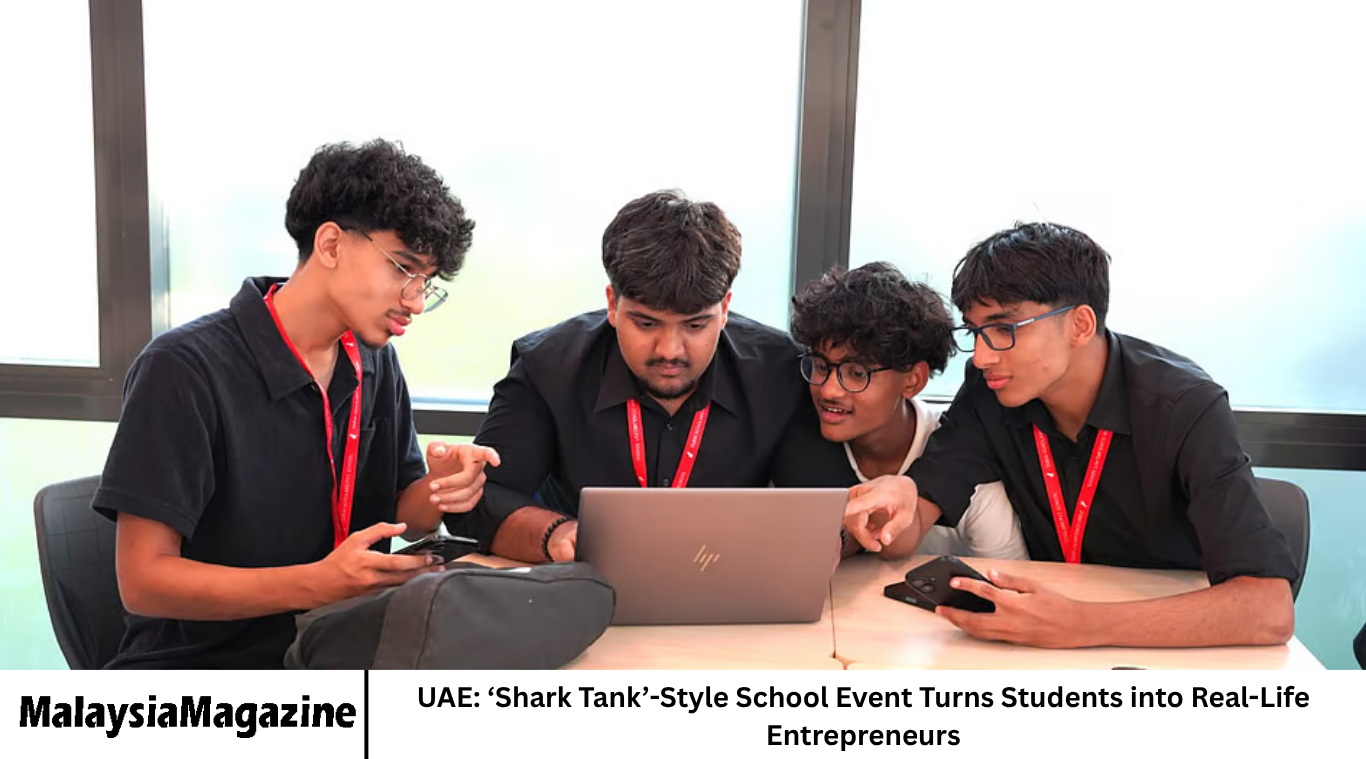In the United Arab Emirates, a new generation of young innovators is learning what it takes to become entrepreneurs. A “Shark Tank”-style school event has given students a rare opportunity to experience the real business world by pitching their creative ideas to a panel of investors, mentors, and business professionals.
This event, inspired by the global success of the popular television show “Shark Tank,” allows students to transform classroom concepts into real-world business ventures. It focuses on teaching practical skills like creativity, financial planning, communication, and teamwork — qualities essential for future entrepreneurs.
The initiative has gained wide attention for promoting entrepreneurship among youth and nurturing innovation within the UAE’s education system, aligning with the country’s vision of building a knowledge-driven economy.
The Concept Behind the Event
The school’s version of “Shark Tank” brings together students from different grades to develop business ideas and present them in front of a judging panel. These panels often include successful business owners, startup mentors, and community leaders who evaluate the ideas based on creativity, feasibility, and social impact.
The goal is not only to inspire entrepreneurial thinking but also to help students understand how to turn ideas into real opportunities. Each team is responsible for developing a business plan, designing a product or service, and pitching it convincingly — all while managing costs and forecasting profits.
Unlike traditional academic competitions, this event focuses on practical application rather than theory. It teaches young participants how to handle pressure, defend their vision, and learn from constructive criticism.
How the Event Works
The competition usually starts with weeks of preparation. Students brainstorm ideas, research market needs, and create prototypes or digital models of their products. Teachers guide them through the process, offering lessons on business strategy, marketing, and presentation skills.
On the event day, teams deliver short, persuasive pitches to a panel of “investors,” much like in the TV show. These investors then ask questions, test the students’ understanding of their product, and sometimes even “invest” virtual funds into the best ideas.
The format encourages innovation and realism. Some schools go further by involving real investors or business incubators that provide mentorship or seed funding to the most promising projects.
Inspiring Creativity and Confidence
One of the main goals of the initiative is to encourage creative thinking and build confidence among students. Many participants start with simple ideas but, through feedback and collaboration, turn them into well-developed business proposals.
For instance, a group of students might come up with an eco-friendly packaging concept, while another might design an app to help people with disabilities navigate public spaces. Through teamwork and mentorship, these ideas evolve into projects that could one day enter the real market.
The event empowers students to take ownership of their ideas and believe in their potential. It also teaches them valuable lessons about problem-solving, public speaking, and resilience — traits that are vital in both business and everyday life.
Real-World Business Lessons
This “Shark Tank”-style event bridges the gap between education and the professional world. Students learn about real challenges such as funding, competition, marketing, and sustainability.
By interacting directly with experienced entrepreneurs, they gain insight into how businesses operate in a fast-paced and competitive environment. Many participants say that this exposure helps them see business not just as a subject but as a living process that requires adaptability and innovation.
In addition, the event emphasizes ethics, sustainability, and community impact — encouraging young entrepreneurs to think beyond profit and consider how their ideas can improve society.
Mentorship and Industry Support
A key feature of the initiative is the involvement of mentors and industry experts. Local business leaders, entrepreneurs, and educators volunteer their time to guide the students throughout the process.
These mentors provide feedback on product design, marketing strategies, and financial planning. They also share their own experiences — including challenges they faced and lessons they learned in their careers.
This mentorship component makes the event more than just a competition. It becomes a real-world learning journey that helps students connect theory with practice and understand how innovation can create real impact.
Encouraging Collaboration and Teamwork
Entrepreneurship is rarely a solo journey, and this event reinforces that lesson. Students work in teams, learning how to collaborate, divide responsibilities, and make collective decisions.
They experience firsthand the importance of communication and cooperation — skills that will serve them well in any career path. Teachers note that students often grow closer as they navigate challenges together, sharing ideas and celebrating successes as a group.
This teamwork-oriented approach mirrors real startup environments, where collaboration drives success and diverse perspectives lead to stronger solutions.
Aligning with the UAE’s Vision
The UAE government has long emphasized innovation and entrepreneurship as pillars of its national development goals. Initiatives like this school event align with the country’s broader strategy to prepare its youth for a rapidly changing economy driven by technology and creativity.
By introducing entrepreneurial education at an early age, schools are helping to nurture a new generation of thinkers and problem-solvers. The event also supports national initiatives such as the UAE Centennial 2071 vision, which aims to build an innovative, knowledge-based economy.
Many education leaders believe that such programs could play a vital role in shaping future business leaders who will contribute to the country’s growth and competitiveness.
Success Stories and Student Achievements
Several students who participated in these events have gone on to develop real businesses or startups. Some have turned school projects into viable ventures, supported by local investors or innovation hubs.
For example, one student team created a solar-powered phone charging station for parks, which attracted interest from local municipalities. Another group designed a mental health app for teenagers, earning praise for addressing an important social issue.
These stories demonstrate how early exposure to entrepreneurship can spark lifelong passion and ambition. They also show that with the right support, young minds can bring meaningful ideas to life.
Educational Impact
Teachers and administrators report that the “Shark Tank”-style competition has transformed how students view learning. Instead of focusing solely on exams and grades, they become more curious, motivated, and proactive.
The project-based format encourages independent thinking, research, and experimentation — all essential elements of modern education. It also provides practical lessons that complement academic subjects like economics, science, and technology.
Students learn how to analyze market trends, create financial models, and understand customer behavior, giving them a strong foundation for future studies or careers in business.
Parental and Community Involvement
Parents and local communities play an active role in supporting the event. Many attend the final presentations, sponsor prizes, or even mentor students. Their involvement helps strengthen the link between schools and society, showing that education extends beyond the classroom.
Some schools also collaborate with local businesses or universities, providing access to resources and professional expertise. This partnership model ensures that the learning experience remains practical, relevant, and impactful.
Future of Entrepreneurship Education in the UAE
As the success of these events grows, more schools across the UAE are adopting similar programs. Some plan to integrate entrepreneurship into their regular curriculum, while others are exploring partnerships with innovation centers and government agencies.
Experts believe that such initiatives will play a crucial role in shaping the UAE’s future workforce. By nurturing entrepreneurial thinking early, the country can ensure that its young citizens are ready to adapt, innovate, and lead in an increasingly globalized economy.
Challenges and Learning Opportunities
While the initiative has been widely praised, it also comes with challenges. Some students struggle with public speaking or financial planning, while others find it difficult to balance creativity with practicality.
However, educators view these challenges as valuable learning opportunities. By overcoming obstacles, students gain confidence and develop a realistic understanding of what entrepreneurship entails.
Schools continue to refine the program based on feedback, adding workshops on communication skills, leadership, and critical thinking to better prepare students for the experience.
Frequently Asked Questions
What is the purpose of the ‘Shark Tank’-style school event in the UAE?
The event aims to teach students entrepreneurship by allowing them to develop and pitch business ideas to real or simulated investors.
How do students participate in the competition?
Students form teams, create business plans, design products, and present their ideas to a panel of judges who evaluate their creativity and feasibility.
What skills do students gain from the event?
Participants learn teamwork, communication, problem-solving, financial planning, and presentation skills through hands-on experience.
Do winning teams receive real investments?
In some cases, the best projects attract mentorship, seed funding, or opportunities to further develop their ideas with business partners.
How does the event support the UAE’s vision for innovation?
It aligns with national goals to promote entrepreneurship, prepare youth for the future economy, and foster creativity within education.
Who mentors or judges the student pitches?
Panels often include local entrepreneurs, business leaders, educators, and industry experts who provide feedback and guidance.
Can students continue their projects after the event?
Yes, many students continue developing their projects, sometimes turning them into real startups or community initiatives.
Why is entrepreneurship education important for young people?
It helps students think creatively, take initiative, and develop life skills that prepare them for success in any career path.
Conclusion
The “Shark Tank”-style school event in the UAE is more than just a competition — it is a life-changing educational experience that prepares students for the future. By encouraging innovation, teamwork, and practical problem-solving, it transforms classrooms into incubators of creativity and confidence.
Through mentorship, collaboration, and real-world exposure, young participants learn that entrepreneurship is not just about making money but about making a difference. The initiative stands as a model of how education can evolve to meet the needs of a dynamic and forward-thinking society.














